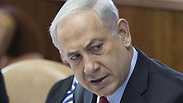
Netanyahu orders cutback in contacts with Palestinian Authority
Prime minister orders a halt to high-level contacts with Palestinians on non-security related issues, but exempts peace negotiator Livni from the ban.
Prime Minister Benjamin Netanyahu has ordered a halt to high-level contacts with the Palestinians on non-security related issues, but exempted his chief peace negotiator from the ban, government officials said on Wednesday.
One Israeli official called Netanyahu's order a response to "the Palestinians' grave violation of their commitments in the framework of the peace talks" - an apparent reference to their signing of 15 international conventions last week.
The edict came a day after US Secretary of State John Kerry suggested that Israel's announcement on April 1 of plans to build about 700 housing units in East Jerusalem was the immediate cause of peace talks plunging into crisis.
Related stories:
- Kerry says Israel responsible for peace talks crisis
- Is the US taking a step back from peace talks?
- China urges Israel to make 'brave' decisions on peace talks
Another official said Israeli cabinet members, directors-general of government ministries and other senior bureaucrats would no longer be allowed to meet their counterparts in the Palestinian Authority, which exercises limited self-rule in the West Bank.
Justice Minister Tzipi Livni, who heads Israel's negotiating team in the troubled US-brokered peace process, and defense and security officials could continue to engage with the Palestinians, the officials said.
Palestinian Labor Minister Ahmad Majdalani, however, downplayed the significance of this decision, noting that "90% of our daily business is dealing with the Israeli military."
"In fact, there are no meetings between Israeli and Palestinian ministers, apart from finance ministers," Majdalani told AFP.
"This decision undermines all international efforts ... to revive the negotiations, to proceed with a constructive solution to the challenges facing the peace process," said PA spokesman Ehab Bseiso.
Israeli and Palestinian officials cooperate on civilian issues such as the environment, water and energy, but Bseiso said this usually does not entail face-to-face meetings.
The PA's main concern focuses on possible economic curbs.
Under interim peace deals, Israel collects and transfers to the PA some $100 million a month in taxes on goods imported into the Palestinian territories. Israel has previously frozen the payments during times of heightened tensions.
Unnecessary decision
Opposition leader Isaac Herzog (Labor) slammed Netanyahu's decision, saying it would serve as "fuel for Israel's haters."
Herzog warned that this decision was a result of frustration and helplessness, and that it would lead to Israel's isolation in the world.
Environmental Protection Minister Amir Peretz (Hatnua) called the decision "unnecessary," saying the cabinet should have discussed it prior to it being made.
Peretz noted he intends to ask Netanyahu for an in-depth discussion on the repercussions of the decision.
At the weekly meeting of his cabinet on Sunday, Netanyahu pledged to retaliate for Palestinian Authority President Mahmoud Abbas's signing of the international agreements, including the Geneva Conventions covering the conduct of war and occupation.
Palestinian officials said Abbas signed the conventions in response to Israel's failure to carry out a promised release of several dozen Palestinian prisoners four days earlier. They were further angered by the subsequent settlement announcement.
Israel said the tender to build new houses in East Jerusalem had already been issued last year and was resubmitted because there had been no initial takers.
AFP, Moran Azoulay and Attila Somfalvi contributed to this report.










